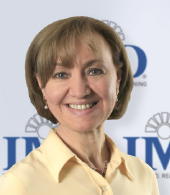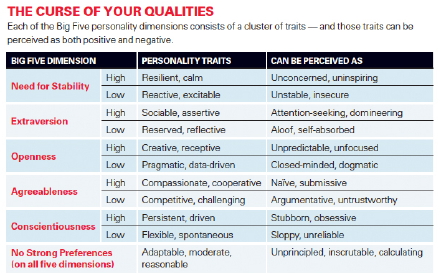The Curse of Your Qualities
Smart leaders know that what can save you can also kill you — that traits that are good in many ways can boomerang back and hit you in the face if you take them too far. Excerpts from “How to Become a Better Leader.”
Topics

Research by Ginka Toegel, a professor of organizational behavior and leadership at IMD (above) and Jean-Louis Barsoux, a senior research fellow at IMD, finds that personality traits common to good leaders also have their downsides.
Image courtesy of IMD.
Smart leaders know that what can save you can also kill you — that traits that are good in many ways can boomerang back and hit you in the face if you take them too far.
In “How to Become a Better Leader,” in MIT Sloan Management Review’s Spring 2012 issue, authors Ginka Toegel and Jean-Louis Barsoux, both of IMD in Lausanne, Switzerland, explore the ways that leaders can recognize and manage their psychological inclinations.
Toegel and Barsoux lay out five personality dimensions, each combining a cluster of traits, that distinguish one person from another. The five factors:
1. Need for stability
2. Extraversion
3. Openness
4. Agreeableness
5. Conscientiousness
But each of these factors has both positive parts and negative parts, as the chart “The Curse of Your Qualities” shows.

Take, for example, factor 2, extraversion. On the plus side, extraverted leaders, the authors write, are sociable and assertive, but they can also be attention-seeking and self-absorbed. “High scores on the extraversion dimension can trigger perceptions that the executive is too talkative or domineering — with the added implication that he or she tends not to listen,” they write, adding:
Many executives face this challenge, including the country manager of a global foods giant we coached. Discussing his proposed action plan, he conceded: “I’ve realized that I have a habit of taking over in meetings. I want to get better at listening and to give less assertive people more space to express their opinions. So I need to listen more, but I also need to show I have processed what they’ve said. The personality scores just confirm feedback I’ve received in the past but not paid much attention to.”
A simple remedy for executives with a tendency to dominate proceedings is the “four sentence” rule: Whatever you have to say, limit yourself to four sentences. Then ask: “Do you want me to carry on?”
Take, as well, factor 3, openness. Leaders who are open often are creative and receptive to ideas, but it they’re receptive to too many directions they can come off as unfocused and frustratingly unpredictable. The authors write:
Speculating on alternative viewpoints and seeking additional perspectives can be frustrating for colleagues who are looking for clarity, consistency and direction. . . . Executives who possess a great deal of intellectual curiosity or creativity can also overwhelm others with the complexity or abstraction of what they are trying to communicate. They can end up confusing others rather than enlightening them. They must force themselves to simplify the message and to translate their thoughts into terms that others relate to.
Someone who struggled with overelaborate thinking is Cristóbal Conde, former CEO of SunGard Data Systems. In a New York Times article, he recalled a piece of advice he received: “A boss once told me: ‘Cris, you’re a smart guy, but that doesn’t mean that people can absorb a list of 18 things to do. Focus on a handful of things.’ Very constructive criticism, and the way I’ve translated that is, when I do reviews, everything is threes . . . three positives and three things they should do differently.”
For more about the upsides and danger points to leadership traits, read the full article. Co-author Ginka Toegel is a professor of organizational behavior and leadership at IMD; co-author Jean-Louis Barsoux is a senior research fellow at IMD.

Comments (2)
What Peter Drucker Would be Reading | The Drucker Exchange
sub